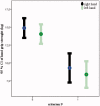Clinical impact of potentially inappropriate medications during hospitalization of acutely ill older patients with multimorbidity
- PMID: 26553225
- PMCID: PMC4750733
- DOI: 10.3109/02813432.2015.1084766
Clinical impact of potentially inappropriate medications during hospitalization of acutely ill older patients with multimorbidity
Erratum in
-
Erratum.Scand J Prim Health Care. 2015;33(4):320. doi: 10.3109/02813432.2015.1127043. Epub 2015 Dec 16. Scand J Prim Health Care. 2015. PMID: 26675267 Free PMC article. No abstract available.
Abstract
Objective: To identify potentially inappropriate medications (PIMs), to compare drug changes between geriatric and other medical wards, and to investigate the clinical impact of PIMs in acutely hospitalized older adults.
Setting and subjects: Retrospective study of 232 home-dwelling, multimorbid older adults (aged ≥75 years) acutely admitted to Vestfold Hospital Trust, Norway.
Main outcome measures: PIMs were identified by Norwegian general practice (NORGEP) criteria and Beers' 2012 criteria. Clinical correlates were laboratory measures, functional and mental status, physical frailty, and length of stay.
Results: Mean (SD) age was 86 (5.7) years, and length of stay was 6.5 (4.8) days. During the stay, the mean number of drugs used regularly changed from 7.8 (3.6) to 7.9 (3.6) (p = 0.22), and drugs used pro re nata (prn) changed from 1.4 (1.6) to 2.0 (1.7) (p < 0.001). The prevalence of any PIM changed from 39.2% to 37.9% (p = 0.076), while anticholinergics and benzodiazepines were reduced significantly (p ≤ 0.02). The geriatric ward reduced drug dosages (p < 0.001) and discontinued PIMs (p < 0.001) significantly more often than other medical wards. No relations between number of PIMS and clinical outcomes were identified, but the concomitant use of ≥3 psychotropic/opioid drugs was associated with reduced hand-grip strength (p ≤ 0.012).
Conclusion: Hospitalization did not change polypharmacy or PIMs. Drug treatment was more appropriate on the geriatric than other medical wards. No clinical impact of PIMs was observed, but prescribers should be vigilant about concomitant prescription of ≥3 psychotropics/opioids.
Key points: Acute hospitalization of older patients with multimorbidity did not increase polypharmacy or potentially inappropriate medications. Prescription of anticholinergics and benzodiazepines was significantly reduced. The geriatric ward reduced drug dosages and discontinued potentially inappropriate medications more frequently than the other medical wards.
Keywords: Aged; Norway; clinical pharmacists; general practice; general practitioners; geriatric assessment; inappropriate prescribing; polypharmacy; psychotropic drugs.
Figures
Similar articles
-
Prevalence of potentially inappropriate medications and risk of adverse clinical outcome in a cohort of hospitalized elderly patients: results from the REPOSI Study.J Clin Pharm Ther. 2014 Oct;39(5):511-5. doi: 10.1111/jcpt.12178. Epub 2014 May 21. J Clin Pharm Ther. 2014. PMID: 24845066
-
Potentially inappropriate medications defined by STOPP criteria and the risk of adverse drug events in older hospitalized patients.Arch Intern Med. 2011 Jun 13;171(11):1013-9. doi: 10.1001/archinternmed.2011.215. Arch Intern Med. 2011. PMID: 21670370
-
The impact of hospitalisation to geriatric wards on the use of medications and potentially inappropriate medications - a health register study.BMC Geriatr. 2020 Jun 1;20(1):190. doi: 10.1186/s12877-020-01585-w. BMC Geriatr. 2020. PMID: 32487225 Free PMC article.
-
Medication use in older patients and age-blind approach: narrative literature review (insufficient evidence on the efficacy and safety of drugs in older age, frequent use of PIMs and polypharmacy, and underuse of highly beneficial nonpharmacological strategies).Eur J Clin Pharmacol. 2019 Apr;75(4):451-466. doi: 10.1007/s00228-018-2603-5. Epub 2019 Jan 4. Eur J Clin Pharmacol. 2019. PMID: 30610276 Review.
-
Potentially inappropriate medications in community-dwelling older adults.Res Gerontol Nurs. 2014 Jul-Aug;7(4):178-92. doi: 10.3928/19404921-20140210-01. Epub 2014 Feb 19. Res Gerontol Nurs. 2014. PMID: 24530281 Review.
Cited by
-
Chronic pain among community-dwelling elderly: a population-based clinical study.Scand J Prim Health Care. 2016 Jun;34(2):159-64. doi: 10.3109/02813432.2016.1160628. Epub 2016 Apr 11. Scand J Prim Health Care. 2016. PMID: 27065337 Free PMC article.
-
Reviewing Potentially Inappropriate Medication in Hospitalized Patients Over 65 Using Explicit Criteria: A Systematic Literature Review.Drug Healthc Patient Saf. 2021 Nov 3;13:183-210. doi: 10.2147/DHPS.S303101. eCollection 2021. Drug Healthc Patient Saf. 2021. PMID: 34764701 Free PMC article. Review.
-
Health status and health care utilization after discharge from geriatric in-hospital stay - description of a register-based study.BMC Health Serv Res. 2021 Jul 31;21(1):760. doi: 10.1186/s12913-021-06751-3. BMC Health Serv Res. 2021. PMID: 34332571 Free PMC article.
-
The association between geriatric treatment and 30-day readmission risk among medical inpatients aged ≥75 years with multimorbidity.PLoS One. 2022 Jan 7;17(1):e0262340. doi: 10.1371/journal.pone.0262340. eCollection 2022. PLoS One. 2022. PMID: 34995327 Free PMC article.
-
Relationship Between Potentially Inappropriate Medications And The Risk Of Hospital Readmission And Death In Hospitalized Older Patients.Clin Interv Aging. 2019 Nov 4;14:1871-1878. doi: 10.2147/CIA.S218849. eCollection 2019. Clin Interv Aging. 2019. PMID: 31806945 Free PMC article.
References
-
- Nyborg G, Straand J, Brekke M.. Inappropriate prescribing for the elderly: a modern epidemic? Eur J Clin Pharmacol 2012;68:1085–94. - PubMed
-
- Saltvedt I, Spigset O, Ruths S, Fayers P, Kaasa S, Sletvold O.. Patterns of drug prescription in a geriatric evaluation and management unit as compared with the general medical wards: A randomised study. Eur J Clin Pharmacol 2005;61:921–8. - PubMed
Publication types
MeSH terms
LinkOut - more resources
Full Text Sources
Other Literature Sources
Medical


